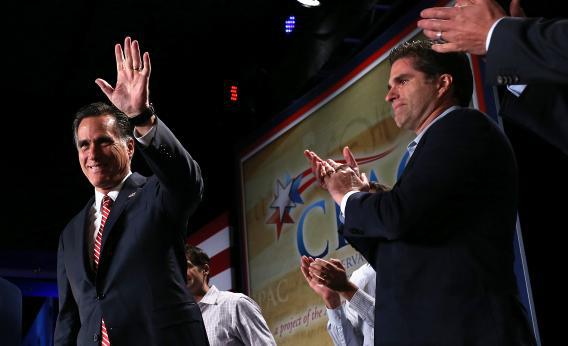Fellow scribes, it’s tough to admit this, but it’s time. Most of the time and money spent covering Mitt Romney’s quest for the presidency, from the comped CNN Grill at the conventions to the Wi-Fi bills at the debates to the exorbitant campaign plane charges, would have been better spent elsewhere. The campaign as a campaign was vacuum-sealed and sort of pointless.
I bring this up because Sam Stein, one of the best scoop-rustlers in D.C., is up with a story that’s actually quite old. Stein got a copy of Dan Balz’s new campaign book (review copies have been around for a while) and found this lede:
Over the Christmas break of 2010, Mitt Romney and his family took an internal poll on whether he should run for president once more. Twelve family members cast ballots. Ten said no. One of the 10 was Mitt Romney himself.
The doubts that the former Massachusetts governor harbored before ultimately launching his second unsuccessful bid for the presidency are one of several attention-grabbing details in “Collision 2012,” the newest book on the 2012 campaign.
Attention-grabbing, but not new. During the campaign, Romney’s oldest son, Tagg, cited this story as proof that his father, far from the kind of guy who’d write off 47 percent of voters, was humble and not calculating. Michael Barbaro, one of the Romney beat reporters at the New York Times, reported the “family vote” story in August 2012.
Mitt, Ann, and their five sons and daughters-in-law convened at the beach house for a quadrennial ritual: a family vote on a presidential run. The decision had been unanimous in 2006, but this time around, the enthusiasm was gone. There was a good chance he might not make it through the primaries, Mr. Romney warned, anticipating scrutiny of his Massachusetts health care plan and his Mormon faith. “Why go through the process just to lose again?” he asked, one relative recalled.
The vote was 10 to 2, with only Ann and Tagg favoring a run.
Over the next few months, Mr. Romney told his family three times that he had decided against a race. After all the planning, he had flinched.
Then he stopped flinching, obviously. No knock here on Stein or Balz, but Mitt Romney wasn’t really a riddle wrapped inside an enigma wrapped inside a business suit.
